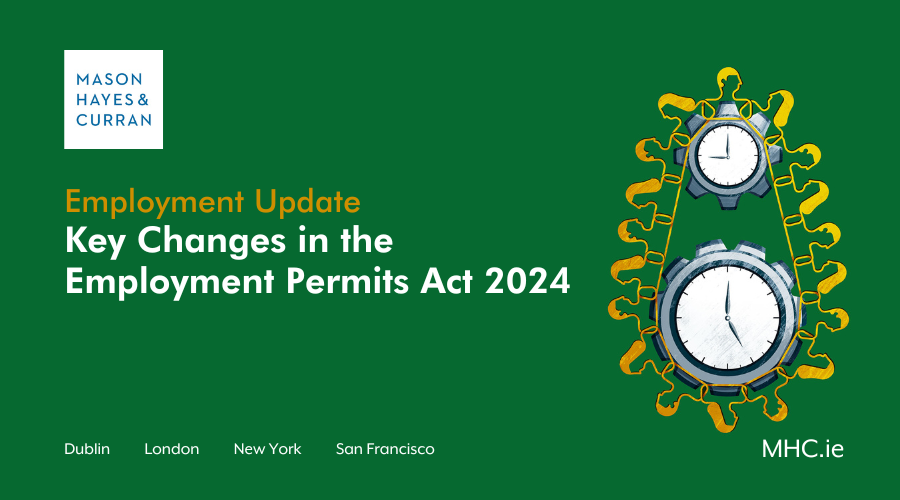Key Changes in the Employment Permits Act 2024

The Employment Permits Act 2024 brings crucial updates to Ireland’s permit system, offering new flexibility for employers and workers. Key changes include a Seasonal Employment Permit, streamlined access for subcontractors, and faster job mobility for permit holders. To stay ahead and ensure compliance, read the breakdown by our Employment Law & Benefits team of how these changes could impact your business.
The Employment Permits Act 2024 (the Act) introduces several important updates aimed at improving the employment permit system in Ireland. We provide a summary of some of the key changes that will impact both employers and workers.
1. Seasonal Employment Permit
The Act introduces a new Seasonal Employment Permit to address the seasonal labour needs in certain sectors, such as horticulture. Employers will need to be pre-registered as Seasonal Employers. A pilot scheme for this permit will be launched in the horticulture sector in 2025.
2. Subcontractors
Subcontractors will now have access to the employment permit system. This update is particularly significant for industries that rely on subcontracted work, ensuring they have the flexibility to meet their staffing needs.
3. Labour Market Needs Test
The Labour Market Needs Test has been modernised. Employers are no longer required to advertise job vacancies in print media. Instead, job adverts can now be placed on one or more online platforms. Additionally, vacancies must still be published on the Jobs Ireland/EURES websites operated by the Department of Social Protection.
4. Change of employer
The Act introduces new flexibility for certain employment permit holders to change employers after nine months, subject to conditions. This was 12 months previously.
5. Six-month rule
A new provision requires that the foreign national must commence employment within six months of the permit being granted. This rule aims to ensure that permits are utilised promptly, reducing delays in filling critical roles.
6. 50:50 rule revision
The 50:50 rule, which previously limited employers with no employees at the time of the application to hiring only one permit holder, has been revised. This change provides more flexibility for small businesses or startups.
7. Salary indexation
In order to ensure that remuneration thresholds for employment permits remain at least in line with average wage growth, a provision has been made for indexation against the annual change in mean weekly earnings. This will increase Ireland’s attractiveness as a destination.
8. Progression within roles
Permit holders can now be promoted within their roles without the requirement for a new permit.
9. Agencies allowed to sponsor work permits
The Act allows for employment relationships that can facilitate the salary of a permit holder to be paid by an entity other than the employer i.e. an agency.
Conclusion
The Employment Permits Act 2024 brings about significant changes that will benefit both employers and workers by making the system more flexible, modern, and responsive to the current needs of the labour market. Employers should familiarise themselves with these updates to ensure compliance and to take full advantage of the new opportunities they present.
For more information about the Act and how it may impact your business operations, contact a member of our Employment Law & Benefits team.
The content of this article is provided for information purposes only and does not constitute legal or other advice.
Share this:



